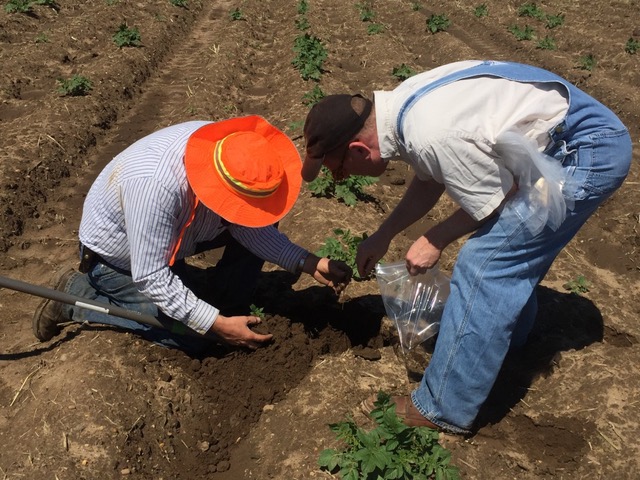Healthy soil for healthy potatoes
Noah Rosenzweig, assistant professor in the Michigan State University Department of Plant, Soil and Microbial Sciences works to reduce disease and enhance soil health for sustainable potato production.

Noah Rosenzweig, an assistant professor in the Michigan State University (MSU) Department of Plant, Soil and Microbial Sciences, likens growing healthy crops to constructing buildings.
“If you're thinking about a house, for example, you need a sound foundation,” he said. “Soil health is really the foundation of crops.”
As co-director of a four-year, $8 million project funded by the U.S. Department of Agriculture (USDA) National Institute of Food and Agriculture (NIFA) and run through the University of Minnesota, Rosenzweig is examining how to enhance soil health in potato production while simultaneously reducing potato scab and Verticillium wilt, also known as potato early die.
Fellow PSM faculty members Kurt Steinke and Lisa Tiemann are part of the project, which is guided by the U.S. potato industry and National Potato Council research priorities.
“A lot of grower clientele, which are the bigger companies — such as McDonald's and Walmart — they're all looking to have metrics and measurables to basically give them credit for sustainability,” said Rosenzweig. “They really want to push potato production into a more sustainable direction.”
Rosenzweig is investigating ways to enhance the ability of soil to suppress disease Verticillium wilt and scab, caused by the fungi Verticillium and the bacteria Streptomyces, respectively.
“The severity of both diseases is lower in different areas within the field or at different field locations — that seems to be a phenomenon that we've seen for a long time in certain potato production areas,” he said. “That's really due to the biology of the soil and the environment in the soil.”

According to Rosenzweig, there’s no consistent management practices for Verticillium wilt or scab. The NIFA project aims to develop practices to manage these diseases and reduce the use of chemical treatments, including fumigation.
“Fumigation is pretty much putting gas in the ground,” he said. “We want to see if we can reduce our reliance on it. We know fumigation’s not going to go away forever, but if we can use it less, we think it might be a better way to produce potatoes.”
Alternatives to fumigation include commercial biological products, or cultural practices like cover crops and longer crop rotations.
“If you lengthen a rotation, then the pathogen doesn't build up as much in the soil, and then you can reduce the amount of disease,” said Rosenzweig.
Rosenzweig’s research includes experimental trials assessing treatments and length of rotations at MSU’s Clarksville Research Center. He’s also looking at grower fields on farms throughout Michigan.
“A big component of examining growers’ fields is looking at the soil microbiome, or the interaction of the disease with all the other bacteria and fungi in the soil,” he said. “We're using some DNA-based technologies to look at that, but we're also looking at some of the general measurements of physical and chemical properties of the soil as well.”
In addition to larger, nationwide impacts, his efforts to reduce disease like Streptomyces will directly benefit potato growers in Michigan — the top producer of potatoes for potato chips in the U.S.
“Streptomyces don’t reduce yield, but they reduce the marketability of the potato,” said Rosenzweig. “When you have potatoes that are infected with scab, they create these legions, and that means that when the processors get these, they have to peel more potato back to get the chip.”
Rosenzweig, who has lived in Michigan nearly all of his life, said he is grateful for the opportunity to make a difference in the state’s agricultural industry.
“By working with growers, I'm indirectly helping the economy, but also helping the environment and also creating a sustainable agricultural economy in the state,” he said. “It's just something that I'm really proud to do, and I just get a kick out of it. I feel like it's kind of a mission for me, but also works within the land-grant mission of Michigan State.”



 Print
Print Email
Email





